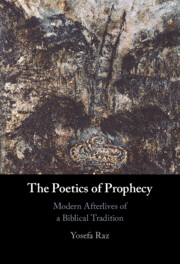Book contents
- The Poetics of Prophecy
- The Poetics of Prophecy
- Copyright page
- Dedication
- Contents
- Illustrations
- Acknowledgements
- Introduction
- Chapter 1 Seraphic Choirs and Stuttering Prophets: Symmetry, Disorder, and the Invention of the Literary Bible
- Chapter 2 Walking through William Blake’s Irregular Bible
- Chapter 3 The Myth of Primordial Orality and the Disfigured Face of Written Prophecy
- Chapter 4 Ahad Ha’am’s Mask of Moses and the Secularization of Prophetic Power
- Chapter 5 Haim Nahman Bialik: The National Poet’s Cup of Sorrows
- Afterword
- Bibliography
- Index
- Index of Biblical Quotes
Introduction
Prophetic Strength and Weakness
Published online by Cambridge University Press: 14 December 2023
- The Poetics of Prophecy
- The Poetics of Prophecy
- Copyright page
- Dedication
- Contents
- Illustrations
- Acknowledgements
- Introduction
- Chapter 1 Seraphic Choirs and Stuttering Prophets: Symmetry, Disorder, and the Invention of the Literary Bible
- Chapter 2 Walking through William Blake’s Irregular Bible
- Chapter 3 The Myth of Primordial Orality and the Disfigured Face of Written Prophecy
- Chapter 4 Ahad Ha’am’s Mask of Moses and the Secularization of Prophetic Power
- Chapter 5 Haim Nahman Bialik: The National Poet’s Cup of Sorrows
- Afterword
- Bibliography
- Index
- Index of Biblical Quotes
Summary
As prophetic texts were charged with new meanings by readers of the Bible in the eighteenth and nineteenth centuries, exegetes, philosophers, artists, and poets tried to define what made a prophet strong and successful, hoping to find new models for artistic inspiration and political and national leadership, as well as integrity, courage, and authenticity. Yet even as prophetic figures were idealized as powerful men who could stride with towering authority and speak with majestic resonance, they also served as emblems of exile, failure, and alienation. Modern representations of prophecy vacillate between emptiness and fullness, strength and weakness. This instability in the representation of prophets and prophecy originates in the biblical text itself. We can trace a countertradition of poets, who, rather than trying to find heroes, create hierarchies, and systematize the biblical text, using prophecy’s instability to enliven and enrich their own texts. They actively exploit the fissures of both ancient and modern prophecy to create stirring, innovative, and often radical literary works from prophetic weakness itself.
Keywords
- Type
- Chapter
- Information
- The Poetics of ProphecyModern Afterlives of a Biblical Tradition, pp. 1 - 26Publisher: Cambridge University PressPrint publication year: 2023



